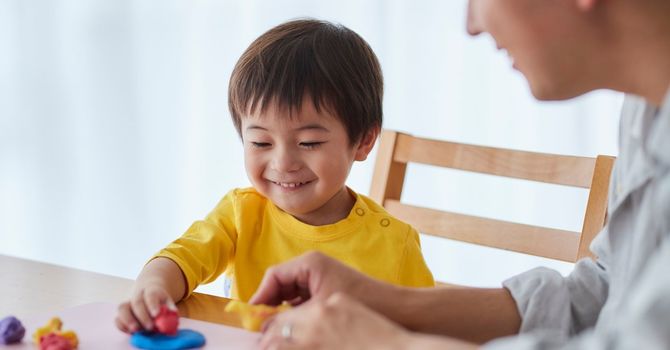I have a daughter diagnosed with AD/HD. I find, both as a parent and as a psychologist who diagnoses and treats AD/HD, that there are times when it is difficult to look beyond the challenges demonstrated by my daughter and my clients. I realize how difficult it is to live with this focus on a daily basis when we have a child, spouse, parent, sibling, or even ourselves, struggling with challenges. That is why I found it so refreshing to receive this article from Dr. Edward Hallowell, one of my favorite doctors and authors in the study of AD/HD and learning challenges. Although it is important to both diagnose and treat AD/HD, it is essential that we see these individuals as whole beings with challenges, yes, but also wonderful strengths. I really wanted to share Dr. Hallowell’s words with as many people as possible and felt that this would be the easiest way to do so. I know that I am likely ‘preaching to the choir’ by writing this, but I think it is a great thing to tuck away and read when we are feeling the weight of the challenges those we love are experiencing. I will not present the full article, but I will present an abridged version of it using Dr. Hallowell’s own words. Enjoy!
It is time, long since past due, to follow a strengths-based paradigm as we understand children's minds, especially the minds of those children who struggle to learn – a model that emphasizes talents, interests, and strengths as well as the obstacles that get in the way of their developing. Priscilla Vail, a dear friend and educator, understood these children so well. In her book, Smart Kids with School Problems, she simply called them "conundrum children." They had talent, but they struggled to do school well. "They are not looking for the easy way out," Priscilla used to say. "They are looking for the right way in." It is high time for us to help them find their various right ways in.
One of the great myths many parents buy into is that school performance predicts performance in adult life. It does not. Albert Einstein struggled in school. Abraham Lincoln, Harry Truman, William Faulkner, Edward Albee, and Ernest Hemingway didn't even graduate from college. James Carville, David Neeleman (founder of JetBlue), Clarence Page (Pulitzer Prize winning columnist), and Sharon Wohlmuth (Pulitzer Prize winning photo journalist) all have Attention Deficit / Hyperactivity Disorder (AD/HD).
And yet, in most schools, and in the hearts and minds of most adults and even children, smart vs. stupid is the gradient upon which a student's mind and general worth gets measured. If you get good grades, you are smart. If you don't, you are either stupid or lazy or both. This primitive and inaccurate notion dies hard. While we try to kill it, using all the science we have to refute it, it continues to kill the spirits of millions of children and adults every year.
The predictors of living the best kind of life are not the grades but the attitudes developed during childhood. Attitudes like: confidence; enthusiasm; a strong interest in something; optimism; the ability to persist in the face of disappointment; the ability to ask for help when you need it and give help when it is needed; spunk; a sense of humor; courage; ambition; the ability to take responsibility and to do the right thing when no one is looking – these are the attitudes that actually do predict doing well in life. And, great news, everyone can develop these attitudes. Unlike top grades, which necessarily are reserved for just a few, every child can develop the positive attitudes named above.
By far, the most dangerous learning disabilities, what truly holds people back in life, are not AD/HD or dyslexia. The dangerous disabilities are fear, shame, loss of hope, broken confidence, shattered dreams, and a feeling of being less-than. Those are the disablers. Without meaning to, teachers, parents, doctors and other professionals instill these disablers every day – in the name of helping children.
The model I advocate is a model that identifies talents and strengths first and foremost, and only then looks at what is getting in the way of developing those talents and strengths. As a psychiatrist who specializes in treating so-called learning disabilities like AD/HD and dyslexia, I see every child who has AD/HD or dyslexia as a champion-in-the-making. It is up to me, and all the other adults, to make sure the champion emerges.
I know whereof I speak. I have both AD/HD and dyslexia myself, and I wouldn't trade either for the world. This is because I have learned, in my nearly 30 years of practicing psychiatry, that these "disabled" children are anything but. I think of them as "magnificently minded." Confidence, enthusiasm, a sense of humor, courage, ambition, optimism, these are the attitudes that predict doing well in life.
I have learned that embedded in the learning problem, embedded in the challenged mind, there are precious gems. It is my job – our job – to mine them. It is simply a fact that most people who possess great talent also face great challenges. Think to yourself of the highly talented people you know. How many of them struggle with depression, or an anxiety disorder, or substance abuse, or bi-polar disorder, or AD/HD, or dyslexia? In fact, it is difficult to find a highly creative person who does not struggle with one of those conditions. But if all they feel is the presence of the negative and never hear about the positive, then they begin to become just the negative.
By adopting a model that emphasizes what's right, what's good, what's strong in a person, it becomes far easier to work on the problems, simply because the child and the parents are doing so in a context of hope and enthusiasm. Instead of feeling like a disabled child in need of treatment, the child can feel like a champion in the making, a member of the society of the magnificently minded. That switch in emphasis, I have learned, makes all the difference in the world.
If your child is struggling in school, take heart. His or her learning problem is likely a marker of talent. Sure, there is a struggle. Sure, you worry. Sure, you hate to see your child work hard and get poor grades. But you can take steps to mine the gems. Be sure you are working with a professional and a school which can help you develop the talent, not just address the problems and struggles. You need to do both simultaneously – develop talent and address shortcomings – but in an atmosphere that is free of shame and fear and full of hope and positive energy.
This is not spin doctoring. This is the truth. This is the method that works the best. The conundrum children Priscilla Vail wrote about are some of our most talented children. But they need special help. Otherwise their talent can go to waste and they can lead lives of chronic underachievement. They usually can't unwrap their gifts on their own. They need a great teacher, an angel of a coach, a parent who never gives up on them and works as their advocate. They need to know that at least a couple of people believe in them no matter what.
The good news is that today we have more ways of unwrapping these children's gifts than we have ever had before. From medications, to exercise-based treatments, to neurofeedback, to nutritional remedies, to specialized coaching and tutoring, to mindfulness training, we have a vast and potent armamentarium from which to draw.
But I am here to tell you, based on 30 years of real life-in-the-trenches experience, the most potent treatment of all, bar none, is love. Especially love sustained over time. Nothing comes close in its power to bring out the best in a person.
If you have a conundrum child, a member of the society of the magnificently minded, you might feel that I am writing a fairy tale. You might feel that your child is cursed with a terrible disadvantage. Before you go there, let me warn you that that kind of thinking risks becoming a self-fulfilling prophesy. Your child needs you to believe in him or her no matter what.
It is an heroic journey, both on the part of the child and the parents. And don't forget the special heroes called teachers and coaches. It won't happen overnight. There is no quick fix. But work with a doctor and a school that "gets" your child, sees the sparkle, values the positives, and you will find your way to a magnificent life for your magnificently-minded child.
Send an email today to info@eckert-psychology.com, visit our website at www.eckertcentre.com, or call Darlene at 403-230-2959 ext.33 so we can help you find that “just right” professional counsellor or coach who believes in your child as much as you do! Together we can help unwrap the gifts that lay hidden within your child or teen with ADHD.
**Edward M. Hallowell, M.D. is an adult and child psychiatrist and the author of several books, including Crazy Busy (2006), Delivered from Distraction (2005) and The Childhood Roots of Adult Happiness (2002). He lectures around the country and is the founder of the Hallowell Center for Cognitive and Emotional Health in Sudbury, MA and New York City. www.drhallowell.com





